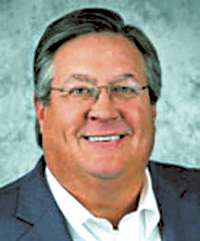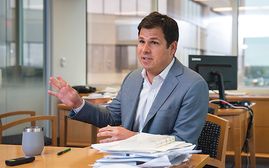
Processing Your Payment
Please do not leave this page until complete. This can take a few moments.
- News
-
Editions
View Digital Editions
Biweekly Issues
- April 29, 2024
- April 15, 2024
- April 1, 2024
- March 18, 2024
- March 4, 2024
- February 19, 2024
- February 5, 2024
- January 22, 2024
- January 8, 2024
- + More
Special Editions
- Lists
- Viewpoints
- HBJ Events
- Business Calendar
- Custom Content
Would-be Hartford med-tech investor faces federal securities, wire fraud charges
 Photo | Contributed
Properties near Hartford Hospital where David Wagner had once promised to build a $45 million health-tech building
Photo | Contributed
Properties near Hartford Hospital where David Wagner had once promised to build a $45 million health-tech building
In early 2017, when the state Department of Economic and Community Development wired CliniFlow Technologies $400,000 to help relocate several of its medical-technology startups from New York to Hartford, along with 195 promised jobs, the company was desperate for cash.
However, CliniFlow founder David Wagner, a Trinity College alum and then-trustee, quickly transferred $65,000 of those funds to an overdrawn business bank account and used $27,000 to buy his daughter a new BMW Model 320.

Wagner, who was facing mounting legal troubles at the time, lied to Connecticut officials in order to secure the funds, marking what may have been his final deal in an alleged years-long “Ponzi-like scheme,” through which he and another business associate solicited $8 million from approximately 30 employee-investors and others.
That’s all according to allegations by the U.S. Attorney’s Office for the Southern District of New York, which on Friday unsealed a criminal indictment against Wagner and one of his corporate deputies, Marc Lawrence, charging each with five counts of wire and securities fraud.
They were arrested and arraigned Friday, in Rhode Island and Florida, respectively, the U.S. Attorney’s office said. Court records show that each was released on bond.
Increasingly worried that investor prospects might find information on lawsuits against his other companies, Wagner formed CliniFlow in mid-2016 to continue soliciting investments, prosecutors say.
He found an unwitting partner in the state of Connecticut, when DECD transferred the $400,000 to him in Jan. 2017. CliniFlow’s bank account at the time contained less than $3, despite the company having raised over $1 million in equity investments since it had formed about eight months prior.
That’s because “significant sums” had been transferred to Wagner himself, the indictment says.
DECD declined comment for this story. While the SEC is seeking disgorged profits and civil penalties, it wasn't immediately clear where DECD might stand in line for repayment, or whether the various companies or the two defendants, now both bankrupt, have any money left.
It appears Hartford may have been Wagner’s final known stop on an approximately three-year journey of allegedly misleading employees, investors and others into funding his purported portfolio of health-technology startups. Besides CliniFlow, Wagner owned or controlled companies that also included Downing Investment Partners, Downing Digital Healthcare Group and Downing Health Technologies.
Wagner and Lawrence, the indictment alleges, used false or misleading statements about, among other things, the financial condition of Downing portfolio companies and various ownership stakes they held, their ability to pay salaries, their management fee structure, and the fact they they had “virtually no products to sell.”
“As alleged, David Wagner and Marc Lawrence were no more scrupulous than practitioners of three-card Monte or the shell game, but for much higher stakes,” Manhattan U.S. Attorney Geoffrey S. Berman said in a statement.
His office filed the wire and securities fraud charges against Wagner and Lawrence in conjunction with the U.S. Securities & Exchange Commission.
Attorneys listed for Wagner and Lawrence in Rhode Island and Florida didn’t immediately respond to requests for comment.
Prosecutors claim that the Downing companies used new investments to pay undisclosed management fees and to compensate earlier employee-investors.
The indictment also alleges that Wagner, in addition to buying a BMW for his daughter with Connecticut taxpayer dollars, had twice before quickly diverted new investments, while his companies were struggling to meet payroll, to purchase high-end Porsches.
Lawrence, who was the president of CliniFlow and several other Wagner entities, helped Wagner mislead and recruit new employee-investors, the indictment alleges.
Lawrence sued Wagner in Nov. 2017, seeking to recover $568,000 in compensation he alleged he was owed, records show.
Caught unaware
The criminal charges are similar to those alleged in a number of civil lawsuits by former Wagner and Lawrence hires, who said they had invested six-figure sums in connection with their job offers, and then were not paid promised salaries, with at least one investor never receiving a single paycheck.
Most never recovered their investments and are still owed back pay and expense reimbursements, the indictment alleges.
DECD officials said they were unaware of the lawsuits when the agency transferred $400,000 in Small Business Express funds to CliniFlow’s bank account in Jan. 2017, as well as a month later when the Bond Commission approved a $3.6 million package to incent CliniFlow’s proposed move from New York to Hartford.
The Hartford Business Journal was the first to reveal, in Nov. 2017, the legal problems facing Wagner and his companies. DECD told HBJ in 2017 that Wagner appeared to have lied on his funding application about not having any “outstanding, pending or anticipated” legal issues, which is cited in the new federal complaint.
By the time HBJ reported those details, DECD had already pulled back the Bond Commission funds, after CliniFlow failed to meet agreed-upon project milestones. In the end, DECD lost a total of $400,000 it provided CliniFlow to help get the project up and running.
As part of its original pitch, CliniFlow said it planned to relocate three of its health technology companies — 3si Systems, SpearFysh and Vox MediData — to a newly built, 70,000-square-foot office building on properties owned by Hartford Hospital, which was a key player in introducing Wagner to state officials, according to emails previously obtained by HBJ through a Freedom of Information request.
Following HBJ’s story, DECD said it would change the way it vets out-of-state businesses that seek economic incentives, but wouldn’t elaborate further.
Since the Hartford deal fell apart in 2017, Wagner’s civil legal troubles have included a personal bankruptcy, millions of dollars worth of civil legal judgments, and a lender’s court-approved seizure of technology assets that Wagner had told local officials would be developed in Hartford.
Lawrence filed for personal bankruptcy in May 2018 in Florida, court records show. Allegedly duped investors have filed adversary proceedings in both mens’ bankruptcy cases.
Related Content
Pathetic performance by Connecticut and the DECD. Not even MINIMAL due diligence by them. Everyone in Hartford should be ashamed of themselves. When will they ever learn?

2022 Giving Guide
This special edition informs and connects businesses with nonprofit organizations that are aligned with what they care about. Each nonprofit profile provides a crisp snapshot of the organization’s mission, goals, area of service, giving and volunteer opportunities and board leadership.
Learn more
Subscribe
Hartford Business Journal provides the top coverage of news, trends, data, politics and personalities of the area’s business community. Get the news and information you need from the award-winning writers at HBJ. Don’t miss out - subscribe today.
Subscribe
2024 Book of Lists
Delivering Vital Marketplace Content and Context to Senior Decision Makers Throughout Greater Hartford and the State ... All Year Long!
Read Here-
2022 Giving Guide
This special edition informs and connects businesses with nonprofit organizations that are aligned with what they care about. Each nonprofit profile provides a crisp snapshot of the organization’s mission, goals, area of service, giving and volunteer opportunities and board leadership.
-
Subscribe
Hartford Business Journal provides the top coverage of news, trends, data, politics and personalities of the area’s business community. Get the news and information you need from the award-winning writers at HBJ. Don’t miss out - subscribe today.
-
2024 Book of Lists
Delivering Vital Marketplace Content and Context to Senior Decision Makers Throughout Greater Hartford and the State ... All Year Long!
ABOUT
ADVERTISE
NEW ENGLAND BUSINESS MEDIA SITES
No articles left
Get access now
In order to use this feature, we need some information from you. You can also login or register for a free account.
By clicking submit you are agreeing to our cookie usage and Privacy Policy
Already have an account? Login
Already have an account? Login
Want to create an account? Register
Get access now
In order to use this feature, we need some information from you. You can also login or register for a free account.
By clicking submit you are agreeing to our cookie usage and Privacy Policy
Already have an account? Login
Already have an account? Login
Want to create an account? Register










1 Comments